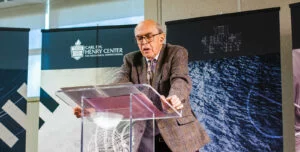In the 2020 documentary My Octopus Teacher, filmmaker Craig Foster offers us a vivid account of a human undergoing a process of recovering from the depredations of overly managed, hyper productive modernity under the tutelage of a tiny octopus. Foster lives on the ocean, in the western cape of South Africa. After burning out in his career as a filmmaker and producer, he decides to follow the example that has impressed him, the tracking practices of the bushmen of the Kalahari. He sets himself the task of learning the ways of one kelp forest by skin diving in it every day for a year.
I think it is safe to say that he falls in love with the common octopus who he meets in the course of this experiment. In following the twists and turns of the life of this octopus Foster comes to see himself as having moved from looking in on ecological questions, to a view of the world from the inside of this ecosystem, indeed, from the inside of the view of the octopus. “What she taught me was to feel,” he observes, is, “that you’re part of this place, not a visitor. That’s a huge difference.” Though Foster’s imagination of his place in creation is altered by a relationship with an octopus and without a hint of a theistic presumption, it is a vision and a process that seems to me to resonate deeply with the ecotheology on offer in Plundering Eden. In Wagenfuhr’s terms, Foster might be said to be grasping after glimmers of how we were made to live as beings created to image God. (The route followed by Foster’s transformation is an uncannily illuminating inversion of the 2016 Hollywood blockbuster Arrival, in which a human also tries to gain an immersive connection to an octopus-like alien, and discovers in the process a message that leads not into, but out of, the earth’s ecosystem.)
I want to follow up two interrelated themes from Wagenfuhr’s idiosyncratic and deeply insightful book. I would like, first, simply to highlight the sweeping radicality of Wagenfuhr’s proposal. His vision of Christian kenotic faithfulness demands a type of human unwinding of civilization. I will then query how this ethical proposal is linked to the rather disembodied picture of Christian worship assumed by Wagenfuhr.
It is worth pausing to explain why I have called this book idiosyncratic. Wagenfuhr’s prose could be said to invert the problem of most academic writing, prone, as it is, to hiding behind citations. Wagenfuhr’s prose drives forcefully forward, citing very few sources, even though he is clearly very widely read indeed. The precious few footnotes accompanying the stripped back prose are to scripture, Ellul, and social anthropologists, and in that ranking, by volume. This might make the book baffling to lay readers in that Wagenfuhr demands quite a lot of background knowledge for the logic of the argument to be intelligible. Scholarly readers, in contrast, might wish that the targets of Wagenfuhr’s plenteous negations of rival positions has been more explicitly named. Overall, however, this prose style provides a terse and fast-moving treatment studded with sparkling theological and conceptual insights. So much for the form of the argument. Now, briefly, to two points about the content of the book.
It was certainly arresting to discover that Wagenfuhr’s vision of redeemed humanity is a type of “rewilded” being. This ethical conclusion is built on a set of a tight and insightful linkage of ecological and theological problems. Modern human beings are obsessed by the drive to manage the world (rapacious ecological practices), along with their relations to other human beings (political managerialism). The logic of both sorts of drive to manage and exploit attract Christians technologically comported management regimes by which the unruliness of scripture can also be domesticated. These are crucial and all too rare insights.
It was certainly arresting to discover that Wagenfuhr’s vision of redeemed humanity is a type of “rewilded” being.
From this starting point Wagenfuhr then presents his alternative as grounded in resisting all suggestions that humans participate in God’s continual creation or have any responsibility to “finish” or perfect the creation. Human making is laborious and different in kind than that of God—human making is only “niche construction,” whereas God’s is effortless creation by the word.There is more overlap with Markus Mühling’s account of human imaging God as niche construction here than Wagenfuhr would probably be comfortable admitting, since he insists on such a strong discontinuity between the modes of divine and human making. See Mühling’s Resonances: Neurobiology, Evolution, and Theology: Evolutionary Niche Construction, the Ecological Brain and Relational-Narrative Theology (Göttingen: Vandenhoeck & Ruprecht GmbH, 2014).
All this leads to a broadside against the dominant view of stewardship or what has been called the human civilizational mandate. Humans were not created to be farmers, but gatherers devoted to land care:
Land care . . . prioritizes the good of the whole, the commonwealth of all creation. It may allow for modification, like erosion control and pruning. But its primary purpose is not the production of a crop. . . . This land care is the imitation of God’s sustaining work, rather than an imitation of creation, as in co-creationist theologies (pp. 94–95).
Sinful humanity tries to make the world better than the Creator and in our age does this through comprehensive management regimes. This is precisely what renders us parasites on creation.What is clear is that his reasons for positioning humans as parasites rests on theologically insightful grounds. Wagenfuhr presents this proposal with an uncharacteristic gingerness at the outset of the book, broaching the suggestion that ecotheology must begin from clarity about the ways that human beings are parasitic on the created world (p. xi).
It is unclear to me how aware Wagenfuhr is that this analytical starting point has many unapologetic defenders. What is clear is that his reasons for positioning humans as parasites rests on theologically insightful grounds. Whereas much of the biblical studies literature has tended to present God as waging a war against chaos in the creation of the world, for Wagenfuhr the opposite is the case: God’s faithfulness to creation is to fight the chaos that we as sinful humans uniquely inject into the created realm. God does fight chaos, not to create the world, but to preserve it, by overturning in the work of Christ our violence, and for the sake of all creation (pp. xvii–xviii).
It is here that Wagenfuhr’s picture of Christian worship seems too ephemeral. Like Wagenfuhr, the French philosopher Michel Serres shares the premise that humans are parasites on the created realm, but takes this insight one giant step further than Wagenfuhr:
Animal-raising and vegetable farming are practices that are parasitic on the reproduction of living things. The tree and the cow told us that man never returned or recognized the gifts of flora and fauna. He uses and abuses them but does not exchange with them. He gives food to the animals, you say. Yessir, he gives flora to the fauna, fauna to the fauna, gives inert material to the flora. What does he give of himself? Does he give himself to be eaten? The one who does so will utter a timeless word. One word, host. That of the eucharist.Michel Serres, The Parasite, trans. Lawrence R. Schehr (Minneapolis, MN: University of Minnesota Press, 2007), 82.
The only one who is not a parasite is the one who gives themself wholly as host. This is the logical endpoint of the kenotic Christology proposed by Wagenfuhr, who pulls himself up short of this claim. For Wagenfuhr the theme of kenosis is essentially discharged in a reading of the Genesis command to have dominion. God gave up power in order to become responsible to particular creatures, in order to show what it looks like to live in the redemption he brings by becoming responsible to the particular, rather than living in the irresponsible buck-passing that is the modern managerial cosmology.
It is here that the Calvinist-Zwinglian tenor of Wagenfuhr’s project becomes most visible, which regularly returns to tropes of redemption as the reformulation of imagination. Wagenfuhr does not have a place for Jesus’ own way of presenting an entre’ back into the particularity of creatures:Wagenfuhr cannot engage eucharist in its given materiality because he has already constructed a case in which cereal crops are linked to imperial labor and taxation regimes. “Take, eat, this is my body given for you.” It is noteworthy that Jesus’ dominical command is nowhere treated in the book, even though we can easily imagine that the way for a disembodied humanity to once again begin to consider the particularity of creation would be to take seriously that Jesus himself linked remembrance to a physical act of eating bread and wine.
We do not need a full blown metaphysical account of the eucharistic remembrance of Christ’s work—which Wagenfuhr would usefully reject—in order to point out that Wagenfuhr cannot engage eucharist in its given materiality because he has already constructed a case in which cereal crops are linked to imperial labor and taxation regimes (p. 94). When Jesus teaches his hearers to imitate the birds who are gatherers, not cultivators, according to Wagenfuhr he is pronouncing, “the condemnation of all civilization, based as it is in agricultural surpluses. . . . I do not seriously think Jesus is asking us to pray that God would work through the complexities of global industrial agriculture, and through our work or welfare income to provide enough money to buy food to eat on a regular basis” (pp. 158–59).
Wagenfuhr is almost certainly right that Jesus offers us no blanket justifications for human remaking of creation, which is nothing if not a constantly expressed hubristic belief that it can make the created world so much richer and better than it already is. Jesus, however, makes this point by giving us bread by which he makes himself present to our touch, to our mouths, to be eaten, tasted, ingested, incorporated, metabolized, internalized. Yes, it may be the case that to image God today means to tear up some pavement, to tear down some denuding production and management systems. And yet. Dare we forget that precisely as a subject of imperial conquest, in a world where grain was taxed to fund a rapacious war machine, Jesus “took bread, gave thanks and broke it, and gave it to them, saying, ‘This is my body given for you; do this in remembrance of me’”?
Surely he is at work doing the same today.








Comments
Be the first one to make a comment!